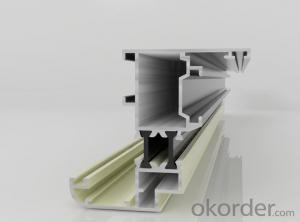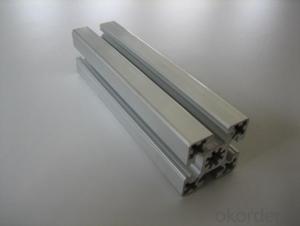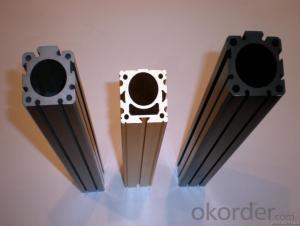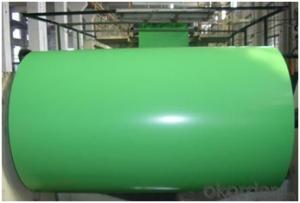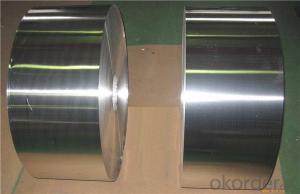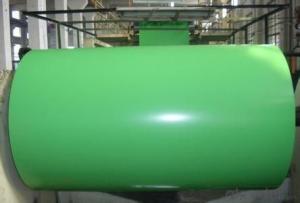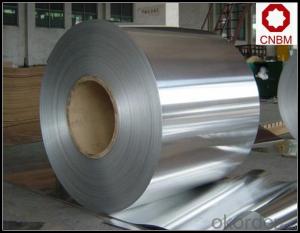Aluminium Alloy Profile for Window and Door in China
- Loading Port:
- Shanghai
- Payment Terms:
- TT OR LC
- Min Order Qty:
- 20 m.t.
- Supply Capability:
- 2000 m.t./month
OKorder Service Pledge
OKorder Financial Service
You Might Also Like
1.Structure of Aluminium Alloy Profile for Window and Door Description:
Aluminium Alloy Profile for Window and Door(also spelled anodising, particularly in the UK and Australia) is an electrolytic passivation process used to increase the thickness of the natural oxide layer on the surface of metal parts. Anodized aluminium surfaces, for example, are harder than aluminium but have low to moderate wear resistance that can be improved with increasing thickness or by applying suitable sealing substances.
2.Main Features of the Aluminium Alloy Profile for Window and Door:
High corrosion-resistance;
weather-resistance;
heat-resistance;
alkali-resistance and impact-resistance properties.
3.Aluminium Alloy Profile for Window and Door Images:
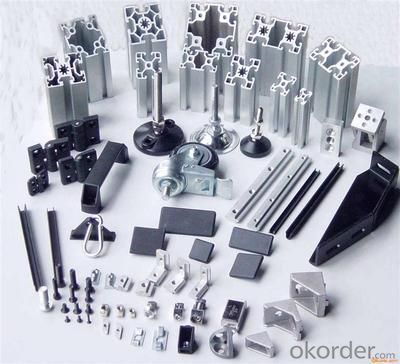
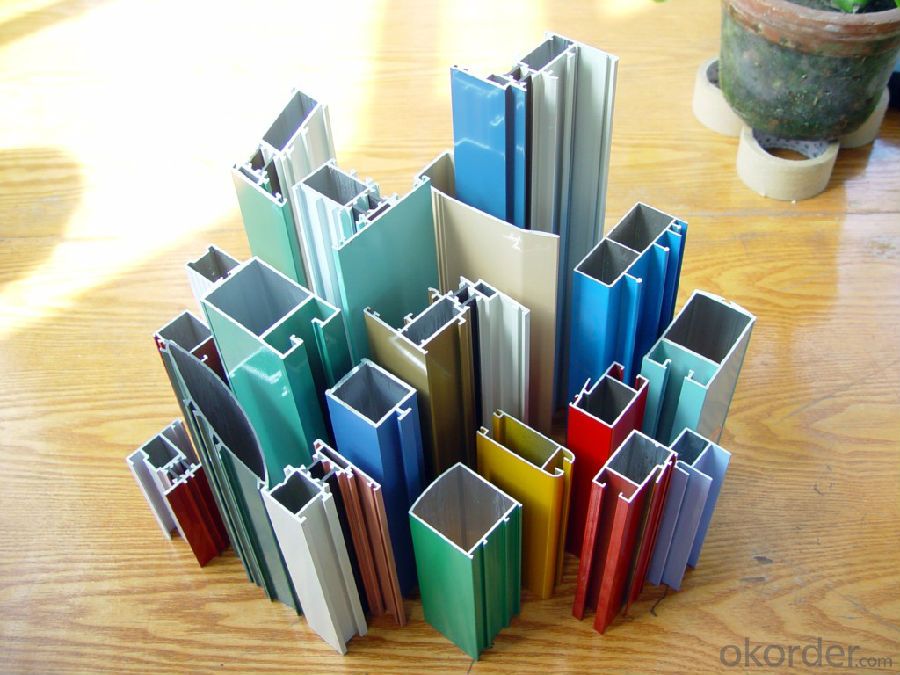
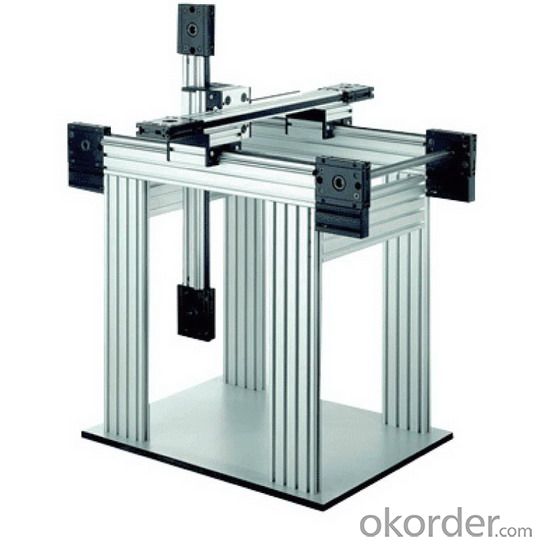
4.Aluminium Alloy Profile for Window and Door Specification:
1. Material: 6063,6061,6060,6005,6005A,etc.
2. Temper: T5 or T6
3. Finish: Mill finish, anodizing, powder coating, electrophoresis, wooden transfer or pvdf/carbon-flouride coated, polishing, brushing, sand blasting
4. Various colors: Silver, bronze, black, gold, blue, grey, champagne, bright, etc.
5. Machining: Cutting, punching, drilling, tapping, milling, bending, welding, CNC etc.
5.FAQ:
①How about your company?
A world class manufacturer & supplier of castings forging in carbon steel and alloy steel,is one of the large-scale professional investment casting production bases in China, consisting of both casting foundry forging and machining factory. Annually more than 8000 tons Precision casting and forging parts are exported to markets in Europe, America and Japan. OEM casting and forging service available according to customer’s requirements.
②How to guarantee the quality of the products?
We have established the international advanced quality management system,every link from raw material to final product we have strict quality test;We resolutely put an end to unqualified products flowing into the market. At the same time, we will provide necessary follow-up service assurance.
- Q:Are aluminum coils suitable for architectural roofing systems?
- Yes, aluminum coils are suitable for architectural roofing systems. Aluminum is lightweight, durable, and corrosion-resistant, making it an excellent choice for roofs. It can withstand harsh weather conditions, is easy to work with, and offers a range of design possibilities. Additionally, aluminum coils are available in a variety of colors and finishes, allowing for customization and enhancing the aesthetic appeal of architectural roofing systems.
- Q:How are aluminum coils used in the production of beverage cans?
- Aluminum coils play a crucial role in the production of beverage cans. These coils are essentially flat, thin sheets of aluminum that are wound into a coil shape. Firstly, the aluminum coils are unwound and fed into a machine that coats them with a thin layer of a protective material, usually a polymer. This coating helps prevent the aluminum from reacting with the beverage and affecting its taste or quality. Next, the coated aluminum coils are passed through a series of rollers that gradually shape them into a cylindrical form. This process is known as cupping, where the flat coil is transformed into a cup-like shape. This cup will eventually become the body of the beverage can. Once the cups are formed, they are trimmed to the correct height and diameter. The excess aluminum is recycled to minimize waste. The cups are then cleaned and rinsed to remove any contaminants. After cleaning, the cups are passed through another machine that applies a liquid compound to their inner surface. This compound acts as a barrier between the aluminum and the beverage, preventing any potential reactions or contamination. Following this, the cups are shaped into the final can body by being pressed between a top and bottom mold. The molds are designed to give the cans their characteristic shape and ridges. Any excess aluminum is trimmed off, and the cans are once again cleaned to ensure their purity. Finally, the cans are sent for filling with the desired beverage, sealing, and labeling processes before being packaged and shipped for distribution. In summary, aluminum coils are used in the production of beverage cans by providing the raw material from which the cans are made. Through a series of processes including coating, cupping, shaping, and cleaning, the aluminum coils are transformed into the final can bodies. These cans are then filled, sealed, and labeled before they are ready for consumption.
- Q:How are aluminum coils packaged for transportation?
- Aluminum coils are typically packaged for transportation in a way that ensures their safety and prevents damage. The packaging process involves several steps to ensure that the coils are well-protected during handling, storage, and shipping. Firstly, the aluminum coils are usually wrapped in a protective material such as plastic or paper to safeguard them from dust, moisture, and other external factors. This wrapping helps to maintain the quality and integrity of the coils throughout the transportation process. After wrapping, the coils are then placed onto a pallet or wooden skid. This allows for easy handling with forklifts or other machinery during loading and unloading. The coils are securely strapped to the pallet to prevent any movement or shifting during transportation, minimizing the risk of damage. To provide additional protection, the coils may be placed inside a wooden or metal crate. This crate acts as a further barrier against potential impacts or rough handling that may occur during transit. The crates are carefully designed to fit the size and shape of the aluminum coils, ensuring a snug fit and preventing any unnecessary movement. Furthermore, depending on the specific requirements and distance of transportation, the coils may also be packed inside a shipping container. This offers an additional layer of protection against external elements and provides stability during long-distance transportation. Overall, the packaging process for aluminum coils prioritizes their safety and protection during transportation. The use of protective wrapping, pallets, crates, and shipping containers ensures that the coils arrive at their destination in optimal condition, ready for further processing or usage.
- Q:Can aluminum coils be used for food processing conveyor systems?
- Aluminum coils are a viable option for food processing conveyor systems. The food processing industry favors aluminum for its advantageous properties. To begin with, aluminum's lightweight nature facilitates effortless installation and transport. This aspect proves especially valuable for conveyor systems that necessitate frequent reconfiguration or relocation. Moreover, aluminum exhibits exceptional resistance to corrosion, a pivotal attribute in food processing environments where exposure to moisture, chemicals, and food particles is prevalent. Additionally, aluminum's hygienic attributes make it easy to clean and maintain, ensuring adherence to food safety standards. Lastly, aluminum coils can be effortlessly molded and customized to meet the specific requirements of conveyor systems, thereby facilitating efficient and effective food processing operations. Consequently, aluminum coils emerge as a fitting choice for food processing conveyor systems.
- Q:Can aluminum coils be customized according to specific requirements?
- Indeed, aluminum coils possess the capability to be personalized in accordance with particular demands. To accommodate diverse applications, aluminum coils can undergo customization to suit distinct dimensions, thicknesses, and finishes. The range of customization options encompasses specific alloys, tempering processes, and even specialized coatings, which serve to enhance corrosion resistance or augment appearance. Furthermore, aluminum coils can be fabricated with specific attributes such as perforations, embossing, or edge treatments, tailored to fulfill precise functional or aesthetic prerequisites. The inherent ability of aluminum coils to be customized bestows upon them a quality of flexibility and versatility, rendering them invaluable across a multitude of industries and applications.
- Q:Can aluminum coils be used in agricultural applications?
- Yes, aluminum coils can be used in agricultural applications. Aluminum is a versatile and durable material that can withstand various environmental conditions, making it suitable for agricultural equipment such as irrigation systems, greenhouse structures, and ventilation systems. Additionally, aluminum's light weight and corrosion-resistant properties make it an ideal choice for agricultural applications where durability and long-term performance are essential.
- Q:What are the different forming processes for aluminum coils?
- Some of the different forming processes for aluminum coils include rolling, coiling, slitting, and annealing.
- Q:I'm asking about the aluminum tabs on soda cans. I've heard mixed things.
- that is correct. salvage yards will be happy to buy you aluminum. 60 cents per pound sounds about right. what are you doing with your cans?
- Q:What is the maximum temperature that aluminum coils can withstand?
- The maximum temperature that aluminum coils can typically withstand is around 400-500 degrees Celsius (750-930 degrees Fahrenheit).
- Q:How do I deal with too much aluminum powder when the aluminum strips are divided?
- For example, the wind speed control did not meet the requirements, or not in accordance with the explosion-proof ventilation system requirements set, including pipeline setting, setting, filter series parallel is the selection of explosion-proof, whether Mars and extinguishing measures.
1. Manufacturer Overview |
|
|---|---|
| Location | |
| Year Established | |
| Annual Output Value | |
| Main Markets | |
| Company Certifications | |
2. Manufacturer Certificates |
|
|---|---|
| a) Certification Name | |
| Range | |
| Reference | |
| Validity Period | |
3. Manufacturer Capability |
|
|---|---|
| a)Trade Capacity | |
| Nearest Port | |
| Export Percentage | |
| No.of Employees in Trade Department | |
| Language Spoken: | |
| b)Factory Information | |
| Factory Size: | |
| No. of Production Lines | |
| Contract Manufacturing | |
| Product Price Range | |
Send your message to us
Aluminium Alloy Profile for Window and Door in China
- Loading Port:
- Shanghai
- Payment Terms:
- TT OR LC
- Min Order Qty:
- 20 m.t.
- Supply Capability:
- 2000 m.t./month
OKorder Service Pledge
OKorder Financial Service
Similar products
New products
Hot products
Hot Searches
Related keywords
